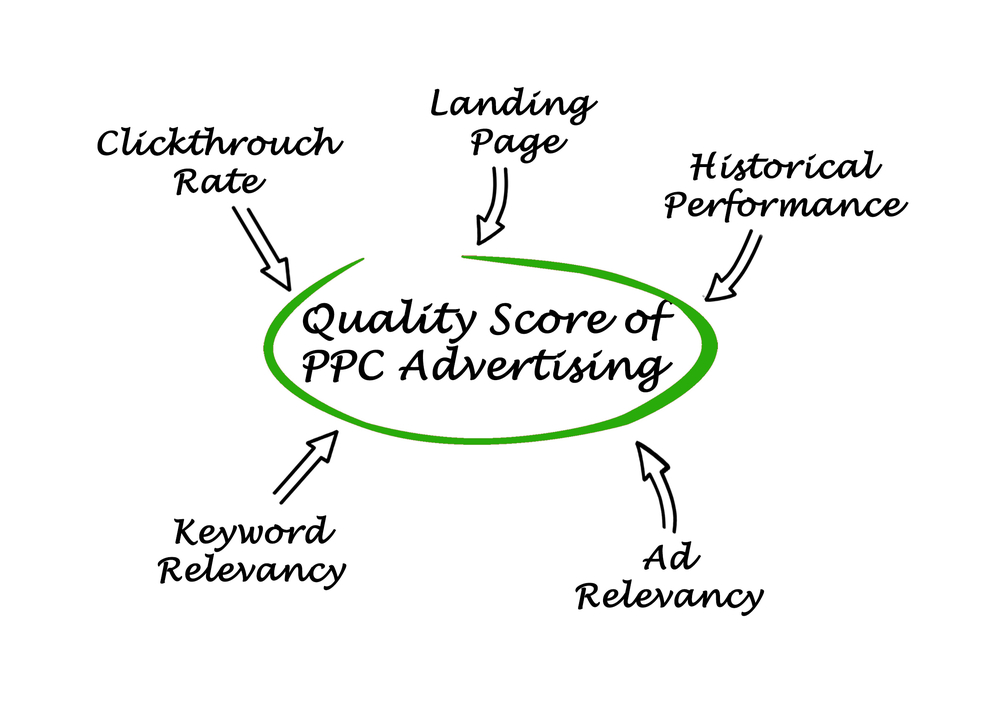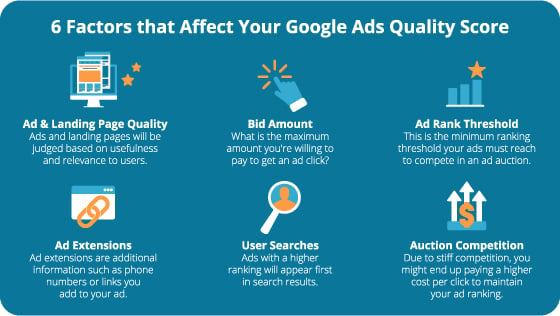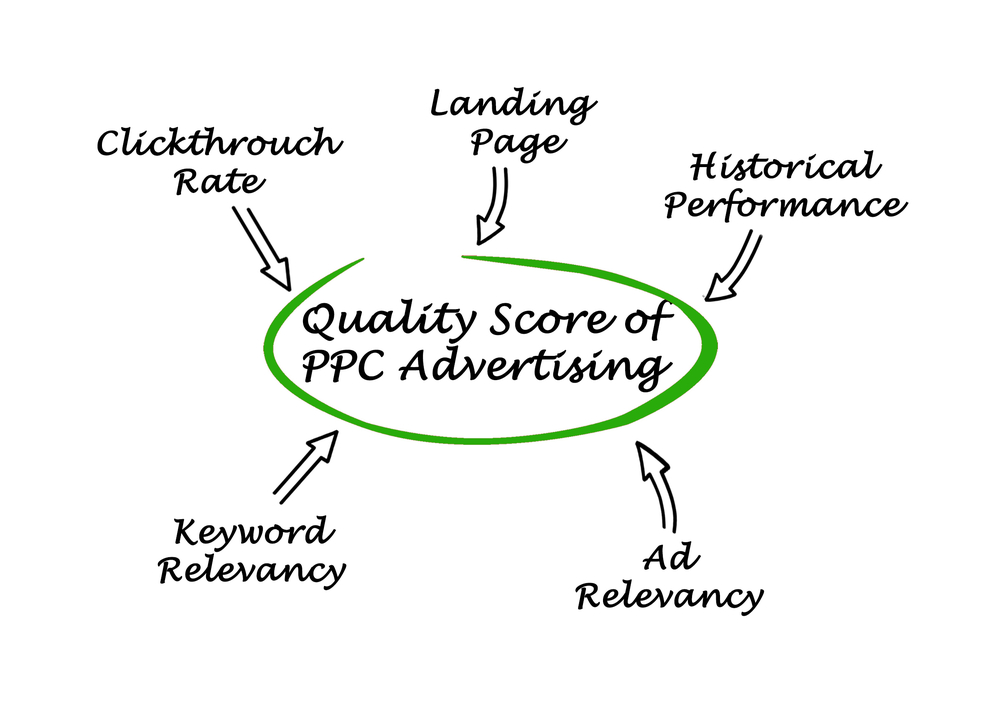
Trying to rank in Google Ads, among hundreds of thousands of other SEO (search engine optimization) competitors can make you want to rip your hair out. Boosting your Google Ads Quality Score can help you get an edge on the competition, save your hair follicles, and make sure your ad copy is among the first that potential customers see.
The problem is, 42.4 percent of consumers say that digital ads targeted based on their search habits are just annoying. So how can you navigate Google ads successfully, building your Quality Score and ranking higher than ever?
We've compiled everything you need to know to boost a lackluster Google Ads Quality Score and skyrocket your ranking — all while attracting your target audience (and saving your hair, too).
What Is A Google Ads Quality Score?
Your Quality Score on your Google Ads estimates your ads, keywords, and landing pages’ quality. It will also consider your expected CTR (clickthrough rate) or your ads’ page loads — that is, how long it takes to load your page on a device.
If you’re loading at a snail’s pace, odds are customers won’t stick around long enough to find out about your services.
How Is Google Ads Quality Score Calculated?
To access your Quality Score, add the Quality Score column to your report. Your Google Ads Quality Score is based on:
- Ad relevance
- Landing page experience
- Expected clickthrough rate.
The better your Google Ads Quality, the more likely you are to have a high Quality Score.
Your Google Ads Quality Score is also based on a scale of 1 to 10. That is, 1 for “C’mon, you’re better than this,” and 10 for “Who’s the best in the biz? Oh yeah, it’s you.” You’re more likely to see higher Quality Scores if your ads and landing pages are more relevant to users.
What Does A Google Ads Quality Score Mean For Businesses?
Did you know 63% of people click on Google Ads? Or that 59% of people prefer to read online about recommendations?
Having a high Google Ads Quality Score means your ads are among the first clicked in these instances, getting you closer to that “best in the biz” status! You will be eligible for better ad placements and lower ad prices if your ad quality is high enough.
What Are Ad Auctions?
Ad auctions are the process Google uses to determine which ads appear for a particular search term. Ad auctions also decide the order of ad positions. Ad auctions even decide whether ads will appear at all in search results.
When someone does a Google search, here's what happens:
- The Google Ads system displays ads with keywords that match the search.
- Only ads with a high Ad Rank will show up.
You want to be on par with the other guys, so you need to know which keywords are best for your business and get you that high Ad Rank score.
What Is An Ad Rank?
Ad Rank is based on four factors:
- Ad quality
- Google search context
- Your ad bid
- The Ad Rank threshold
It’s important to remember that the more relevant your ads and keywords, the higher your ad can be ranked, even above other competing ad bids. Plus, the more relevant your ads and keywords are, the lower your ad bid’s price can be.
There’s no guarantee you’ll always be among the first ads to appear. But digging through the nitty-gritty now to figure out how to improve your ads will only improve your chances.
Ad auctions change and repeat every Google search, but you can still be a top dog in this ad competition.
The Six Ad Rank Factors
Six factors determine your ad rank. Here’s a quick look at each, which we’ll explain in more detail too.

Ad & Landing Page Quality
Google Ads judges your ads and landing pages’ quality for usefulness and relevance to users, determining your Google Ads Quality Score. The catch is, how can you determine quality?
The truth is, you can't. Only your customers can, which is why testing is a crucial part of boosting your Google Ads Quality Score. A foolproof method of enhancing your ad quality is by using A/B testing.
A/B testing means you create two options to try out, then see how consumers respond. But prepare to be surprised — and to think outside the box — because consumer behavior may not be what you expect. Anything from a single exclamation point to the style of your 'click here' buttons can impact the results.
Bids
Your ad bid is the maximum amount you’re willing to pay Google Ads for an ad click. You can change this bid at any time, so you can start small before turning it up and becoming a high-roller.
Keep in mind that you may need to spend money to make money; the Small Business Administration recaps that B2B product companies routinely spend 6.3 percent of their revenue on marketing, while B2C companies spend about 9.6 percent.
Ad Rank Threshold
The Ad Rank threshold determines if you can compete in an ad auction. So your ad position, ad quality, the user’s search terms, the user’s device, the user’s location, and related ad auctions all affect the Ad Rank threshold.
Ads have to reach minimum thresholds in order to show up in a search. Make sure your ads exceed these thresholds for optimum chances at ranking.
Ad Extensions
Ad extensions are additional information such as phone numbers or links you add to your ad. These extensions may impact how well your ad performs, so Google Ads accounts for them. Google ads will look at the context of a user’s search terms and their location, their search time, and the type of device the user is searching from.
User Searches
Two ads with similar ad ranks will have an equal opportunity to win the higher ad rank. However, if there is a gap in their ad ranks, then the higher ranking ad will appear first in the search since their rank is higher.
Auction Competition
You’ve probably picked up on this, but the competition is stiff. Do your research and add appropriate information to get your ad higher than anyone else’s.
Sometimes this even means paying extra for cost per click for your ad. You may not be able to start like this, but as you move your way up the chain, you’ll have more money to spend on Google Ads to keep you consistently ranked higher.
This investment isn’t as bad as it may seem, though, as Google gives an 8:1 investment return -- $8 back for every $1 spent!
What Are Keywords?
When it comes to Google Ads, keywords determine a lot about your ad. Keyword Quality Score makes the difference between a successful ad that doesn’t cost a lot or an unsuccessful ad that costs more than it’s worth. You need to select keywords that accurately represent your business and the products you sell.
The key, if you will, to selecting quality keywords ad groups is thinking as your customer would about your product or business. Keywords are concise and help you appear in full Google search questions and short phrases.
For example, are you a florist? Keywords that are specific, like “lilies” or “roses,” as well as just “flower bouquet,” can be great keyword contenders.
It’s Called A ‘Quality Score’ For A Reason
Google Ads Quality Scores aren’t as complicated or mysterious as they seem — even if your stress levels suggest otherwise. You just need to take the time to research each step of the ad process.
Focus on appealing to consumers in the most effective way possible, and you'll find that your formerly lackluster ads will naturally become more successful. Of course, you don't have to go it alone. If you're interested in becoming a master at capturing more and better leads, book a time with us to learn how to improve your Quality Scores!





.png?width=1625&name=logo%20(1).png)